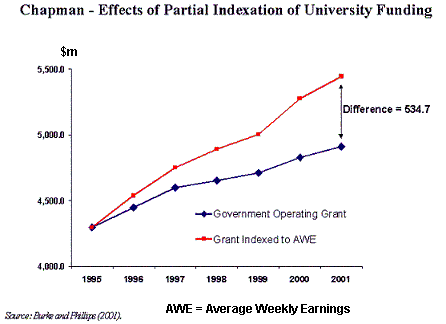|
News & Views item - September 2004 |
![]() President
of AVCC, Di Yerbury, Looks Again at Systematic Decline in Federal Governmental
Funding for Higher Education Through Stingy Indexation Since 1996.
(September 6, 2004)
President
of AVCC, Di Yerbury, Looks Again at Systematic Decline in Federal Governmental
Funding for Higher Education Through Stingy Indexation Since 1996.
(September 6, 2004)

Chapman referred to a study by Hanushek and Kimko (2000), who tested the extent to which educational quality as measured by standardised scores for mathematical and scientific literacy has contributed to economic growth differences averaged over thirty years across 139 countries. Their results suggest, for example, that growth in GDP per capita would have been around one per cent higher per annum if Australia had the average workforce quality of the average of the other 139 countries considered.
At the end of October 2001 Professor Chapman's Vice-Chancellor, Ian Chubb, with the 2001 election looming, told the South Australian branch of the Committee for the Economic Development of Australia, "In an interview in the Sydney Morning Herald on the weekend, Mr. Howard argued that the Government is investing in universities through its Backing Australia's Ability program and he was critical of Vice-Chancellors for what he said was our lack of industrial reform and inefficiency. To quote what he is reported to have said: 'You can spend still more and the Vice-Chancellors will always want to spend more. It would be a good idea if they improved the industrial relations practices of their universities and made them a bit more efficient. That would help enormously.'
"[I]n addition to arguing that Mr. Howard's position on these matters is poorly informed, I intend to argue that more significantly, his remarks indicate a radical misunderstanding of universities and the extent to which business models can be usefully applied to their processes and output.
"I [also] want to challenge the notion that is typified in Mr. Howard's remarks that spending on our knowledge infrastructure is merely a debit line in the national accounts. There is considerable theoretical and some hard econometric analysis in some key areas that indicate that investment in education is the best way to ensure strong economic returns - indeed outstanding returns on money invested
"[T]he Prime Minister's remark that Vice-Chancellors will always want more indicates to you why I am here today. It is unfortunately the case that we live in the time of the "they would say that syndrome."
And then Ian Chubb brought up some home truths: "in 1985 Australia's level of investment [based on GDP] in knowledge was at 85.1% of the total applying to the US. In 1998 the level was 70.5%. Our ratio to that of the OECD was somewhat better but has fallen over the same period from 87% to around 75%."
Thee years have passed, Di Yerbury Macquarie University Vice-Chancellor is now president of the AVCC, John Howard is still Prime Minister and once again he is seeking re-election.
And it seems to be déjà vu all over again. Professor Yerbury in an opinion piece for today's (September 6, 2004) Australian Financial Review write:
Australian Universities operate within complex global markets while... contributing enormously to their local communities... it is essential that the real purchasing power of their spending be maintained. [A review of federal funding indexation for university funding] would be good news for the higher education sector -- providing of course that the outcome is positive [there is of course no such promise].
Professor Yerbury goes on to make the point that the current indexing method in use be the Australian Government is unrealistic. It's based on an amalgam of the CPI and the safety net adjustment for wages where that adjustment is much less than the real increase in salaries' adjustments universities must sustain by law.
The AVCC is more conservative in its calculation of the short fall ($473million by 2003) compared with Professor Chapman who based his chart on average weekly earnings (534.7 million by 2001).
The Minister for Education, Science and Training's Clayton's reviews have come and gone, have brought forth a absurd mouse, and there is no indication that the Prime Minister has altered his views as quoted by Professor Chubb in Adelaide three years ago.